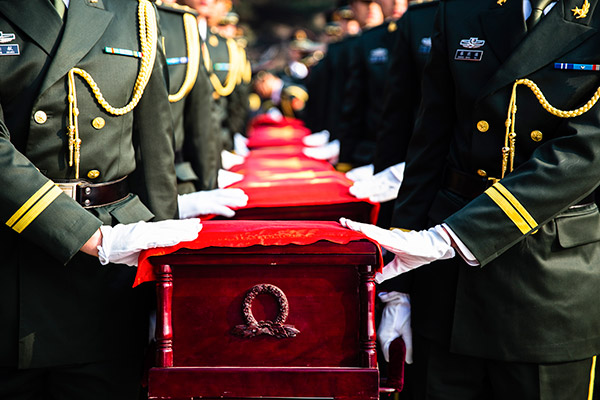
Soldiers escort coffins containing remains of Chinese soldiers killed in the 1950-53 Korean War at a memorial ceremony in Shenyang, Liaoning province, on Oct 29. The remains of 437 soldiers were returned from the Republic of Korea.[Photo by Tang Dayuan/China Daily]
More than 800 stand in silent tribute at memorial for Korean War victims.
The remains of 437 Chinese soldiers killed in the 1950-53 Korean War were buried on Oct 29 at a memorial ceremony in Shenyang, capital of Liaoning province.
Draped in national flags, a symbolic nine coffins, returned from the Republic of Korea on March 28, lay in front of the Korean War monument in the city’s martyrs’ cemetery.
After the national anthem was sung, more than 800 people, including veterans, soldiers’ families and students from elementary schools, stood in silent tribute. Guns thundered a salute to the 197,000 Chinese who died in the war.
Funeral music played as the nine coffins were carried by 18 soldiers to be placed in a grave.
“My father is also buried here. He died in the war in 1953,” said Rao Zhenggang. “I feel that today I am representing my father in welcoming his fellow officers and soldiers home.”
Rao said he was only a year old when his father died and he heard most of the stories about him from his mother.
Last year, Rao published a book about his father’s life called Loyal Soldiers, marking the 60th anniversary of his death.
“My father and people of his generation were selfless and fearless in fighting the war. They gave their lives for the country. Their spirit should be passed to the next generation,” Rao said.
He added that as time passes, people will gradually forget history, so the memorial ceremony serves as a reminder of those who sacrificed their lives during the war, as does his book.
Shan Chengyu, 80, who was sent to the war in 1951 and returned to live in Shenyang in 1953, said: “We should have them back. This is their country.
“I often tell stories about the war to my grandchildren. Fighting a war was tough, but we achieved victory with the support of our country,” Shan said. “We should build our country well. People only live prosperous lives in a prosperous country.”
Li Xiangting said her parents died fighting the civil war in 1949.
“I was two when they died. I was raised by my grandparents, but the government has taken good care of us by providing special pensions and medical insurance,” Li said.
“I am very grateful to our country and the Communist Party.”
